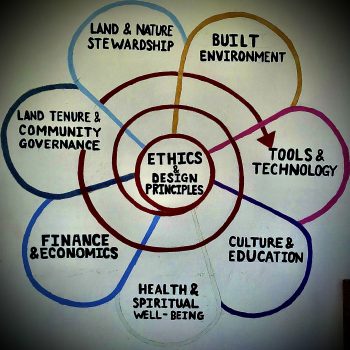Permaculture Principles
Permaculture is a set of design principles that holistically copy what we see in natural ecosystems. While many principles apply to farming and how we consume food, every aspect of life is covered by permaculture and the principles that Mother Earth gives us.
Below we cover how permaculture principles apply to Gaarawe Village, but for more on the ethics and philosophy take a look at this free course collated by the filmmakers behind the Final Straw documentary about slow farming.

Built Environment
Water: We pump water directly from the river to our own water tanks
Building materials: We use local material wherever possible such as stones, bamboo, wood and natural clay.
Self-construction: With the help of many volunteers and local builders/advisors, we built the necessary infrastructure: power lines, houses, common areas, the kitchen, showers and toilets.
Tools and technology
Tools : Work in the garden is done with manual tools, so that our activity is not too invasive. We want to keep worms and microlife in the soil for fertility and biodiversity.
Technology: We have some tools that involve more technology for building or carpentry work: electric saws, drills, etc.
Culture and education
Research : Each project we do begins with research. Knowledge is gained from the internet, visiting experts or local Thai friends.
Art and music: Many artists have contributed to the beauty of the village: from painters and graphic designers to musicians.
Landscape awareness: Before starting this adventure we did geological surveys and checked the dam. In addition, we relied on a talented geologist who gave us a report about the characteristics of the land including erosion risk-assessment.
Spiritual health ad well-being
Yoga and meditation: We sporadically receive volunteers who can lead classes for people staying on-site. We also have a small meditation hut overlooking the garden and a platform that can be used for yoga. We’re looking for teachers who can stay on more permanently and run regular classes or retreats.
Finance and Economics
Eco-tourism and volunteering: The village still relies on tourism to supplement its income, along with the generous contributions of many volunteers. This allows us to have things we can’t make ourselves such as electricity, wifi and drinking water.
Partners: For bigger projects, involving big expenses like building materials or others, we are supported by the village’s partners. Some of them have been residents, others help from afar.
Future income: One source could be to produce enough plants for sale in the local area. We are also building educational programs that we would ask students to pay a small amount for.
Land tenure and community governance
Land Properties : The land has been purchased and is the collective property of a Thai citizen.
Community governance: We rely on the advice of Mother Nature and nearby farmers, who teach us and guide us every step of the way.
Land and nature stewardship
Seed Bank : We exchange seeds and the intention of the village is to become a seed bank for future generations. Also, we try to preserve the seeds from the species we cultivate in our garden .
Organic farming: In the village we have about 200 m/sq of composted vegetable gardens, and we don’t use any chemicals for their cultivation. We occasionally use chilli, vinegar, and lime juice conceptions to deal with pests.
Compost : We have already accumulated and worked on enormous quantities of compost, useful for vegetable gardens and for fruit trees. We are always open to new composting methods and have brewed compost teas, attempted a small worm bin, used hot compost techniques and are building some hugel mounds.
Fruit trees : To meet the needs of the many guests, from the first year, we planted banana and papaya trees in abundance, as well as other species such as tamarind, mango, lime, avocado, and passion fruit. This way we can eat fruit throughout the year and tree roots are key to healthy soil.
Bamboo and Vetiver : These plant species are important for protecting the main borders of the river from erosion. Bamboo is also critically important for future building materials.